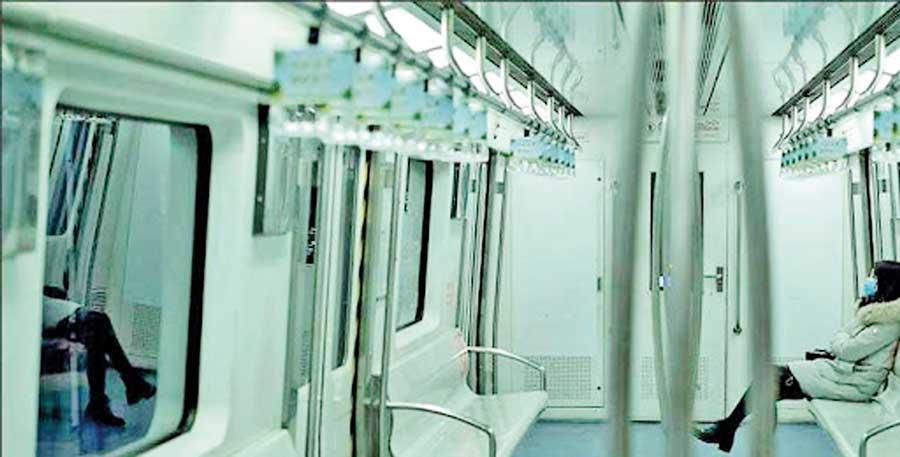05 Feb 2020 - {{hitsCtrl.values.hits}}

A lone woman wearing a face mask travels in the subway in Beijing as the country is hit by an outbreak of the new coronavirus. (Picture credit Carlos Garcia Reuters)
 The World Health Organisation has warned all governments to ‘take action’ over the SARS-like virus that originated in Hubei China. Top economists estimate that 90 percent of the economic impact from health epidemics stems from people’s fear of the unknown. If that’s right, the world economy should brace itself for the full impact of the Wuhan coronavirus.
The World Health Organisation has warned all governments to ‘take action’ over the SARS-like virus that originated in Hubei China. Top economists estimate that 90 percent of the economic impact from health epidemics stems from people’s fear of the unknown. If that’s right, the world economy should brace itself for the full impact of the Wuhan coronavirus.
As countries suspend flights and set aside islands for quarantine, the disruption in China will have global consequences. Last year, retail sales in China topped one trillion yuan (US $ 144 billion) during the lunar new year holiday week, a third more than an average week. That now seems very unlikely 2020 because Chinese people are cancelling trips in numbers. Spending on domestic tourism over the period exceeded 500b yuan in 2019, 8 percent of the annual total. The closure of Chinese factories will also cascade through the global economy. The coronavirus is a powerful reminder to business that a workforce base that is adaptable to any crisis is now a good insurance.
China has been forced to halt all group tours both domestically and to other countries to contain the spread of the coronavirus. The outbreak will therefore hit the Asia Pacific economies, particularly in retail, restaurants, conferences, sporting events, tourism and commercial aviation, travel-related sectors in Thailand, Japan, Sri Lanka, the Maldives, Vietnam and Australia will be particularly impacted.
The rapid rise in household incomes in China in the last five years triggered a boom in Chinese tourism visits abroad, which have risen from 25 million in 2005 to 155 million in 2018. Consequently, the dependence of many Asia-Pacific economies to a slowdown in Chinese tourism visits has increased significantly in the last three years.
China’s growing importance in the Asia-Pacific trade and investment flows has also created considerable vulnerability for the Asia-Pacific region from this type of unpredictable black swan events currently hitting the Asian economy. But the latest developments indicate the regular disruptions to regular economic activity. This may just be the beginning of a new norm in the
Asian region.
Challenge for businesses
The rise of emerging markets, the accelerating impact of technology, epidemics, new talent demands, an aging population and the easy flow of capital and knowledge are having a transformative impact on business, leaders and economies. By 2025, a single regional city in China will have a GDP equal of Sweden (22nd largest economy in the world).
We have never had more data and advice at our fingertips – literally. The iPhone 11 Pro and Samsung Galaxy Note 10 contain far more information and processing power than the original supercomputer. Yet, we work in a world where top CEOs are routinely caught unawares.
Therefore, today the biggest worry for leaders is how disruptive will accelerating global crisis due to war, disease, environmental degradation and technology be for organisations in the future and how they must change their old models and processes to deliver customer experiences that can set themselves apart from their competitors.
For decades, businesses have deployed technology to save lives, management time to reduce costs and complexity, offer better service, make better products and develop new business models. Today customer experiences with Apple or Amazon or Uber are the new standard. Users have grown to expect best in class experiences from all their online and mobile interactions and demand the same on most offline services.
Moreover, the new potential of global wars, epidemics, artificial intelligence, drone technology and advanced robotics poses major new challenges for leaders as they seek to reset their strategies for the new age. Therefore, the question that needs to be asked is: are we at a turning point in how we do business? Today, understanding the disruption is an absolute necessity and leaders would therefore have to reinvent themselves all the time to remain current and relevant.
What’s new is the speed of change and it is dramatically faster than what it was five years ago. However, crisis in whatever form isn’t new. What is different is that in the last few years, the crisis has become far more significant and much more frequent, causing havoc to the traditional economy and companies.
In the coming weeks, the proactive measures the Chinese government implements will determine and help to contain the outbreak. If the action is bold and decisive it can help to push up the pent-up demand for travel to the pre January era once the deadly virus is under control.
26 Dec 2024 42 minute ago
26 Dec 2024 48 minute ago
26 Dec 2024 2 hours ago
26 Dec 2024 2 hours ago
26 Dec 2024 4 hours ago